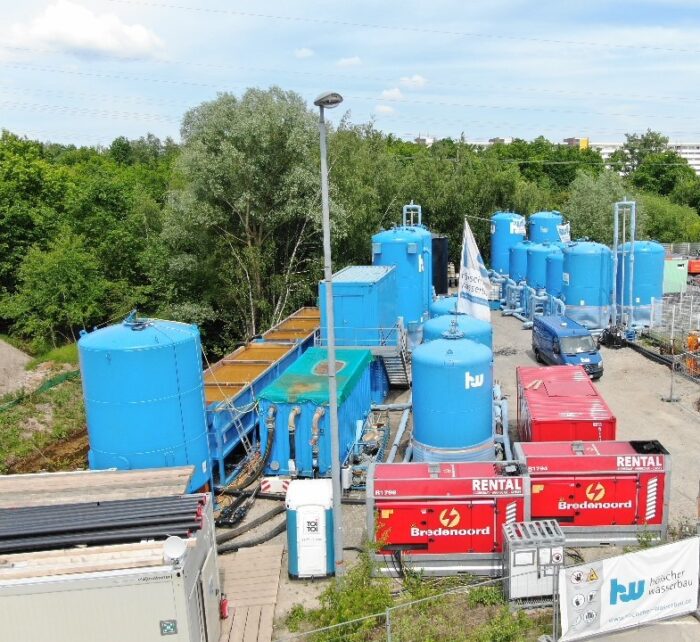The Hölscher Group is a medium-sized globally operating company with numerous international subsidiaries. They offer a comprehensive range of services in the fields of dewatering, well drilling, water treatment and groundwater management. These include construction measures in infrastructure or industrial construction, energy and environmental technology or services such as operation, maintenance, and repairs. The Hölscher Group has companies based in Canada, United Kingdom, Denmark, Poland, Romania, The Netherlands, Qatar and Germany.
Project Walle-Wolfsburg gas pipeline (Northern Germany)
Theme: Dewatering and water treatment for climate protection
The constantly changing groundwater management requirements along entire stretch of pipeline resulting in water treatment in constantly varying intensity and scale and at the same time because of necessity to keep the impact on environment as small as possible at all time in accordance with environmental protection regulations. Success of the project would most certainly not have been achievable without the technical versatility of the treatment plant.
General Situation
In general, large infrastructure projects bring with themselves a numerous boundary conditions and challenges that have to be considered by the companies carrying out the work. This was also the case with a gas infrastructure project between Braunschweig and Wolfsburg, for which Hölscher Wasserbau GmbH was commissioned with the dewatering and water treatment works.
The gas pipeline in question was laid over a total distance of 30 kilometres between the cities of Braunschweig and Wolfsburg. In future it will ensure energy supply to the VW plant and the city of Wolfsburg with the help of two ultra-modern gas-fired power plants on the VW plant premises in Wolfsburg. The switch from coal to gas will lead to a significant reduction in CO2 emissions and is an important measure taken by the VW Group to protect the climate.

Challenges
Along the entire stretch of the gas pipeline Hölscher Wasserbau GmbH had to contend with constantly changing groundwater management requirements. Whilst in some places it was possible to simply lay the pipelines in dry ground, other sections of the route laying beneath the groundwater table would require dewatering and accompanying water treatment procedures in constantly varying intensity and scale. In all cases, simply pumping the excavation pits empty, i.e. open dewatering, was no longer sufficient.

In addition to this, the issue of climate and environmental protection was always at the forefront of this project: the aim was to keep the impact on nature as small as possible during the entire construction phase
and to meet the strict requirements for water protection. To achieve this, Hölscher Wasserbau GmbH developed a sophisticated system of various pumps not only dewatering the water intrenched section of the route, but also transporting the water to a central groundwater purification plant.
Technical implementation
In order to temporarily lower the groundwater level during the construction phase (closed dewatering), Hölscher Wasserbau GmbH first set up vertical filter wells in the excavation pits and installed electrically operated high-performance pumps. A further hurdle to overcome, was implementation of a permanent and stable power
supply to keep the pumps running non-stop and to ensure round the clock groundwater management.
By means of booster stations, the water pressure in the previously laid pipelines transporting the water from the excavation pits was increased enabling the extracted water to be transported to the groundwater purification plant. There it was tested for impurities and purified accordingly, before being re-infiltrated back into the natural water cycle.
The tailor-cut groundwater purification plant was characterised by a total capacity of 150 m³/h and various purification stages. The system was operated with high base pressure and high volume, which resulted in high energy consumption, compensated by two 400 kVA power generators providing the necessary energy around the clock. Each equipped with a double oil sump and extra-quiet motors, not only performance but also all environmental requirements were successfully addressed.
In addition to the centrepiece of the project, the groundwater purification system, various water pumps (Grundvos single and stage pumps, Netzsch positive displacement pumps and various submersible pumps) were in use on the entire track construction site to ensure round the clock groundwater management.
Particular care was required at road crossings and other structures crossing the track construction site, as the dewatering here differs significantly from other “normal” sections of the route. Uncontrolled leakage of water on the passage to the treatment plant was to be prevented at all costs, and continuous operation of the entire system was required. Various pumping and booster stations were therefore built to ensure the smooth running of the water, even under challenging conditions.
In order to be able to guarantee a safe power supply even in the case of unexpected failure or maintenance work, so-called back-up sets have been installed for additional protection. In addition to the power generators in continuous operation, there was a redundant emergency power generator that automatically took over the power supply if required. The fuel supply was ensured by means of level gauges integrated in the tanks of the power generators, external 1,300 litre tanks as well as large 16,000 litre tank containers.
Conclusion
Through the engineering design devised by ourselves and the resulting dewatering system and groundwater purification plant, Hölscher Wasserbau GmbH has been able to not only make a substantial contribution to a large infrastructure project, but also actively contribute to climate protection. Our focus during the entire project was on a type of groundwater management in balance with climate protection.
Water has been their passion for more than 60 years. They are the market leading specialists in Site Dewatering, Well Drilling, Water Treatment and Groundwater Management.
Innovative solutions, sustainable technologies and their dedicated employees, make every project happen – all over the world. They prove this, on a daily basis, on more than 1,000 projects a year.
This content is available to our TDI members only. Please get in touch with riette@dewateringinst.com to get access. If you are not a member yet, you can find out how to become a member here.











